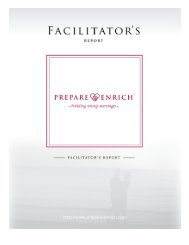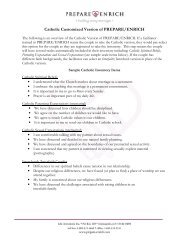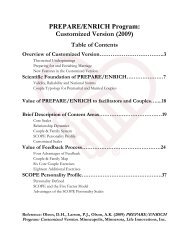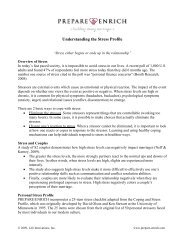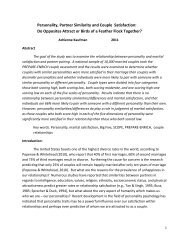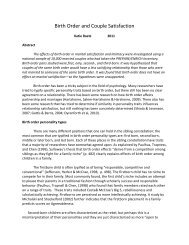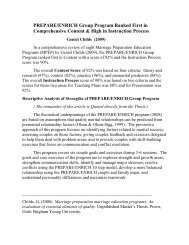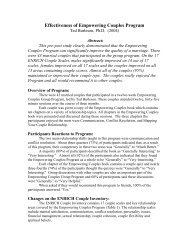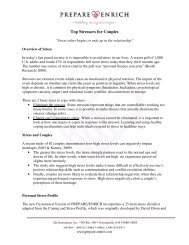Discriminate Validity of Korean Version of ENRICH - Prepare-Enrich
Discriminate Validity of Korean Version of ENRICH - Prepare-Enrich
Discriminate Validity of Korean Version of ENRICH - Prepare-Enrich
You also want an ePaper? Increase the reach of your titles
YUMPU automatically turns print PDFs into web optimized ePapers that Google loves.
Discriminant <strong>Validity</strong> <strong>of</strong> <strong>Korean</strong> version <strong>of</strong><strong>ENRICH</strong> Marital Inventory (K-<strong>ENRICH</strong>)Jae woo Park, Kevin Deokil Kim, Wan young Song, and Jee yeon LeePublished in <strong>Korean</strong> Journal <strong>of</strong> Christian Counseling, 2009ObjectivesThe aim <strong>of</strong> this study was to assess the validity and reliability <strong>of</strong> K-<strong>ENRICH</strong>, which measuresthe key dimensions <strong>of</strong> marriage. In Korea, the increase <strong>of</strong> women’s job involvement and change<strong>of</strong> conventional role expectations has created more marital problems. To ameliorate andintervene with marital problems, it’s very crucial to have a tool for assessing the maritaldynamics.SampleThe subjects <strong>of</strong> this study were clients <strong>of</strong> marital therapy or participants in a seminar for maritalenrichment. They were all <strong>Korean</strong>s, and a total <strong>of</strong> 1058 married couples’ data was analyzed.The couples were divided into a satisfied and dissatisfied groups based on their scores on the 1-item marital satisfaction measure. When both couple reported that they were very or extremelysatisfied, they were classified as the satisfied group (n=597). While the couples whose responsewere somewhat dissatisfied or dissatisfied were classified as dissatisfied group (n=76). Thissample was randomly split to provide validation and cross-validation samples for thediscriminant validity analysis. There were 673 couples’ data out <strong>of</strong> 1058 couples’ data were usedin discriminate validity analysis. To verify validity <strong>of</strong> group classification, chi-square test wasdone using ‘considering divorce’ item as an indicator.ResultsBased on the alpha reliability for each scale, the scales <strong>of</strong> K-<strong>ENRICH</strong> have very acceptableinternal consistencies (Table 1). The average alpha reliability for the 12 scales is .80 and therange is from .63 to .90.The group classification into the satisfied and dissatisfied was proven to be valid (Table 2). Thechi-square analysis clearly showed the two groups were significantly different. When comparingthe two groups on whether one or both partners considered divorce, it was found that in thesatisfied group, 98% <strong>of</strong> the persons never considered divorce. However, in the dissatisfiedgroup, 74% <strong>of</strong> both spouses considered divorce.The K-<strong>ENRICH</strong> scales have high discriminant validity because using only 4 scales, it is possibleto predict the group correctly with 97.0% accuracy (Table 3 and 4). The four scales that weremost predictive were in rank order (high to low): spiritual beliefs, sexual relationship, financialmanagement and role relationship. Finally, multiple regression analysis results show that 7 out <strong>of</strong>10 PCA scales explains 65% variance in couple satisfaction (Table 5). The top five scales weresexual relationship, communication, spiritual beliefs, financial management, and family &friends.
Discussion and ConclusionThe study shows that K-<strong>ENRICH</strong> has high reliability and validity and the 12 scales explainsmany aspects related with marital satisfaction. A limitation <strong>of</strong> this study is that the number <strong>of</strong>dissatisfied group is relatively small compared to satisfied group. Also, the total sample may notbe representative <strong>of</strong> married couples in Korea. In conclusion, K-<strong>ENRICH</strong> was proved to be avalid and reliable inventory that provides a comprehensive picture <strong>of</strong> marriage.Table 1. Reliability <strong>of</strong> K-<strong>ENRICH</strong> ScalesScale NameAlphaMarital Satisfaction .87Idealistic Distortion .90Personality Issue .83Communication .86Conflict Resolution .72Financial Management .85Leisure Activities .71Sexual Relationship .84Children & Parenting .80Family & Friends .72Role Relationship .63Spiritual Beliefs .87Table 2: Chi-Square Test for Grouping <strong>Validity</strong>ConsideringDivorceGroupDissatisfied Satisfied TotalNeither 1351.452.72.5%97.5%100.0%Husband Only 5222718.5%81.55% 100.0%Wife Only 16486425.0%75.0%100.0%Both 42135574.4%23.6%100.0%59767388.7%100.0%Total 7611.3%
Table 3: The Results <strong>of</strong> Discriminant AnalysisOriginal Count GroupDissatisfiedSatisfied% DissatisfiedSatisfiedPredicted GroupMembershipSatisfied4293Dissatisfied34689.52.010.598.0Total38299100.0100.0Table 4: Standardized Canonical Discriminant Function CoefficientsFunction1Spiritual Belief .542Sexual Relationship .446Financial Management .380Role Relationship .212Table 5: The Results <strong>of</strong> Regression AnalysisUnstandardizedCoefficientStandardCoefficientB Beta t Sig.Communication .009 .205 6.013 .000Sexual Relationship .008 .223 8.064 .000Spiritual Belief .006 .143 6.932 .000Financial.004 .127 4.723 .000ManagementFriends and Family .002 .031 2.100 .036Role Relationship .003 .076 2.998 .003Child and Parenting .002 .057 2.339 .017Personality Issues .003 .066 2.075 .038ReferenceBlaine J. Fowers & David H. Olson (1989). <strong>ENRICH</strong> marital Inventory: Discriminant<strong>Validity</strong> and Cross-<strong>Validity</strong> Assessment, Journal <strong>of</strong> Marital and Family Therapy, 15(1). 65-79.All the authors <strong>of</strong> this research give special thanks to Dr. David Olson and pastor Hee-Soo Nahfor allowing us to analyze the data.Authors:Jae woo Park – Department <strong>of</strong> Psychiatry, Holy Family Hospital, Catholic UniversityKevin Deokil Kim – Department <strong>of</strong> Psychology Yonsei UniversityWon young Song – Department <strong>of</strong> Counseling and Psychotherapy, Kongyang UniversityJee yeon Lee – Department <strong>of</strong> Psychiatry, Sang-Gye Paik Hospital, Inje University



